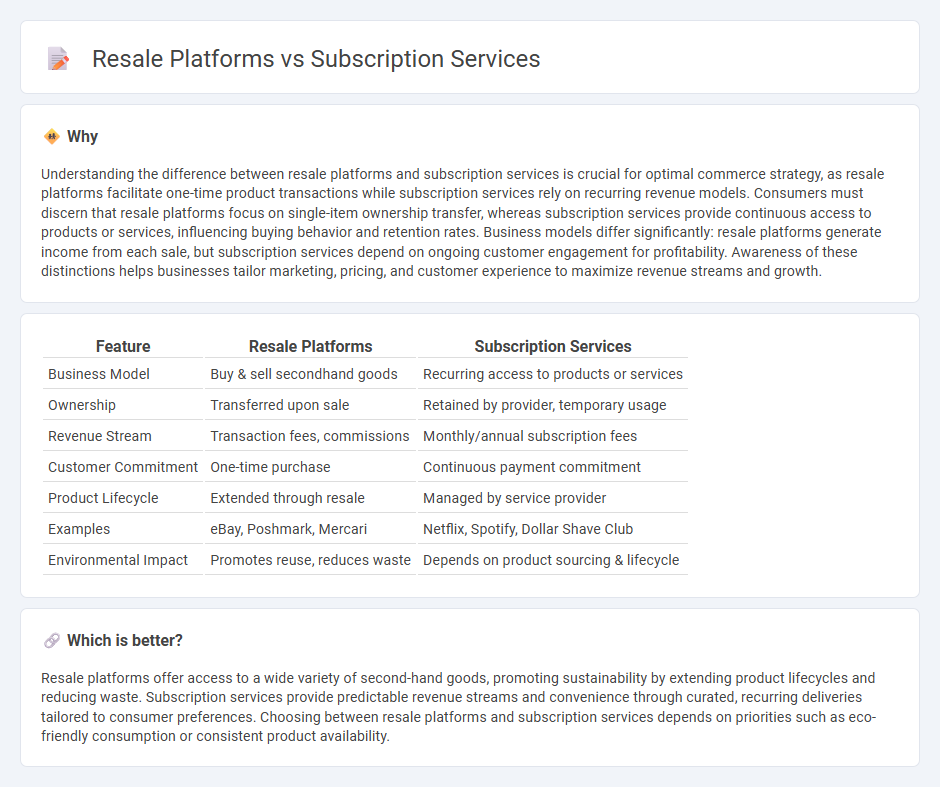
Resale platforms facilitate the buying and selling of pre-owned goods, offering affordability and sustainability by extending product lifecycles, while subscription services provide curated access to products or services through recurring payments, emphasizing convenience and personalized experiences. Both models reshape consumer behavior by prioritizing access over ownership and promoting circular economy principles. Discover the unique benefits and challenges of resale platforms and subscription services in modern commerce.
Why it is important
Understanding the difference between resale platforms and subscription services is crucial for optimal commerce strategy, as resale platforms facilitate one-time product transactions while subscription services rely on recurring revenue models. Consumers must discern that resale platforms focus on single-item ownership transfer, whereas subscription services provide continuous access to products or services, influencing buying behavior and retention rates. Business models differ significantly: resale platforms generate income from each sale, but subscription services depend on ongoing customer engagement for profitability. Awareness of these distinctions helps businesses tailor marketing, pricing, and customer experience to maximize revenue streams and growth.
Comparison Table
| Feature | Resale Platforms | Subscription Services |
|---|---|---|
| Business Model | Buy & sell secondhand goods | Recurring access to products or services |
| Ownership | Transferred upon sale | Retained by provider, temporary usage |
| Revenue Stream | Transaction fees, commissions | Monthly/annual subscription fees |
| Customer Commitment | One-time purchase | Continuous payment commitment |
| Product Lifecycle | Extended through resale | Managed by service provider |
| Examples | eBay, Poshmark, Mercari | Netflix, Spotify, Dollar Shave Club |
| Environmental Impact | Promotes reuse, reduces waste | Depends on product sourcing & lifecycle |
Which is better?
Resale platforms offer access to a wide variety of second-hand goods, promoting sustainability by extending product lifecycles and reducing waste. Subscription services provide predictable revenue streams and convenience through curated, recurring deliveries tailored to consumer preferences. Choosing between resale platforms and subscription services depends on priorities such as eco-friendly consumption or consistent product availability.
Connection
Resale platforms enhance commerce by extending product lifecycles, enabling consumers to buy and sell pre-owned goods efficiently, while subscription services create recurring revenue streams through curated, ongoing product access. Both models leverage digital marketplaces and data analytics to personalize user experiences and optimize inventory management. Integration of resale options within subscription services drives sustainable consumption and expands market reach by combining convenience with circular economy principles.
Key Terms
Recurring Revenue
Subscription services generate recurring revenue by charging customers a fixed fee at regular intervals, ensuring predictable cash flow and higher customer lifetime value. Resale platforms primarily rely on transaction-based fees, which can result in fluctuating income and less revenue stability. Explore strategies to maximize revenue streams and enhance financial growth in both business models.
Secondary Market
Subscription services offer curated access to products through recurring payments, emphasizing convenience and ongoing engagement, while resale platforms facilitate peer-to-peer transactions, enabling consumers to buy and sell pre-owned items within secondary markets. The secondary market benefits from resale platforms by promoting sustainability, extending product lifecycle, and providing affordability through used goods circulation. Explore further to understand the nuanced dynamics and economic impacts within the secondary market.
Customer Retention
Subscription services enhance customer retention by providing consistent value through curated products and personalized experiences, fostering long-term loyalty. Resale platforms attract users by offering unique, often cost-effective items, but may face challenges in maintaining continuous engagement due to transactional nature. Explore more about strategies to boost customer retention in these models.
Source and External Links
Subscription business model - A model where customers pay recurring fees at regular intervals (monthly, yearly, etc.) for ongoing access to products or services, common in industries like media, software, and utilities, with variations such as freemium, tiered, and usage-based pricing.
70+ Top Subscription Based Companies In 2025 - Subbly - Highlights popular subscription services particularly in fashion and beauty such as GLOSSYBOX and IPSY, which offer monthly curated and personalized product boxes with flexible subscription durations.
Subscription Business Model: How and Why It Works (2025) - Shopify - Describes three main subscription types--curation, replenishment, and access--outlining their benefits and challenges, with curation models (subscription boxes) being popular for product discovery and customer loyalty building.
 dowidth.com
dowidth.com